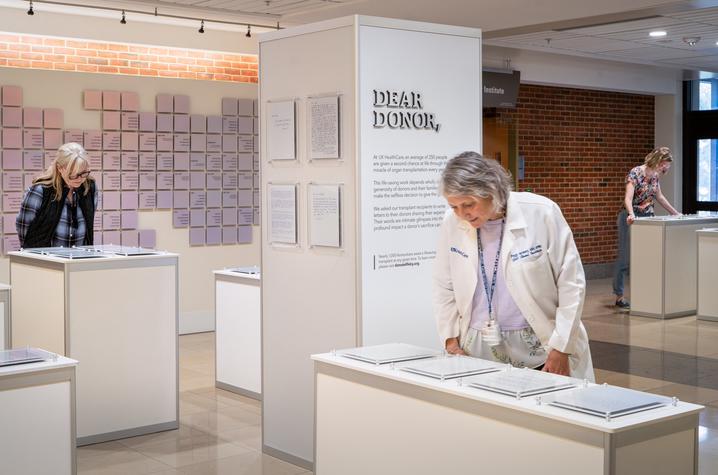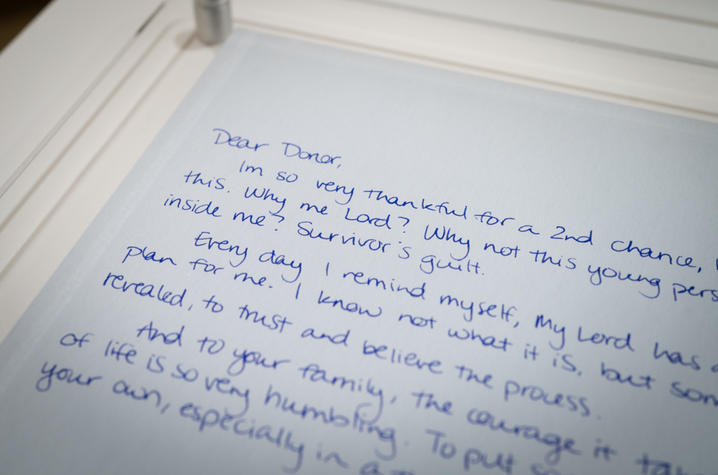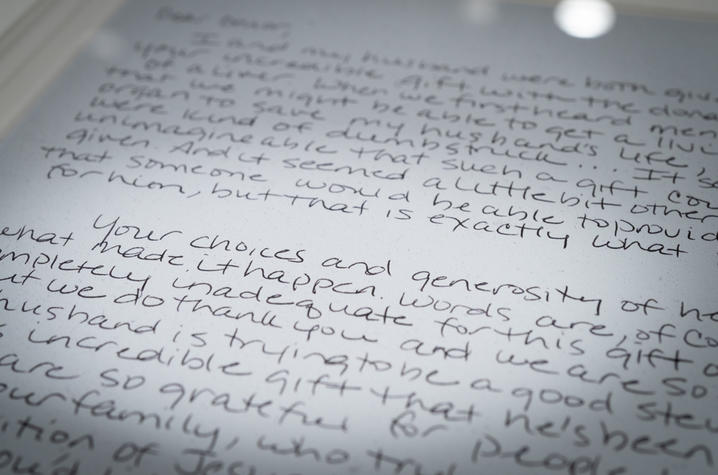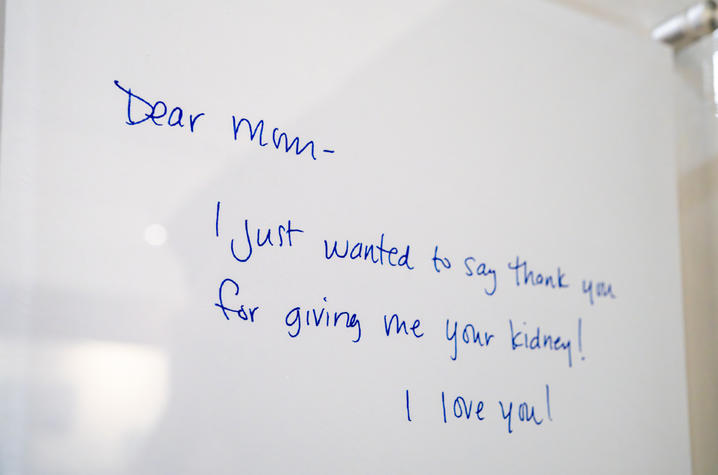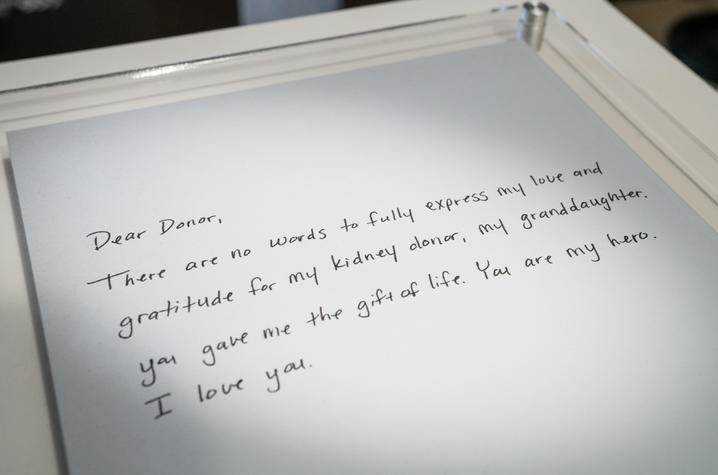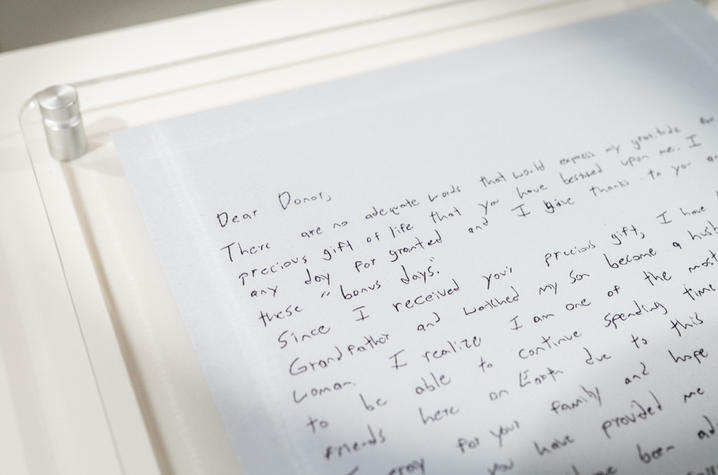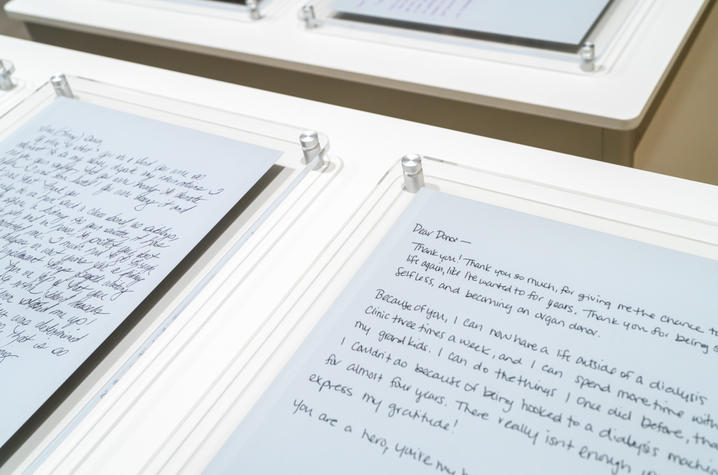‘Dear Donor’ project showcases gratitude, appreciation from transplant recipients
LEXINGTON, Ky. (April 12, 2024) — “We may not have walked the same path before, but today you walk with me ...”
Thus begins one of the anonymous letters written by an organ transplant recipient to their donor. The author goes on to celebrate their donor’s life legacy and express immense gratitude for the gift of a new life.
“I do not know the dignity of your birth or the tragedy of your death,” the letter continues. “But you left a legacy, which I try to honor every day.”
Each year at UK HealthCare, an average of 250 people are given a second chance at life through the miracle of organ transplantation. This life-saving work depends wholly on the generosity of donors and their families who make the selfless decision to give the gift of life.
Most organ recipients will never meet their donor, whose death made a second chance at life possible. Nor will they have the opportunity to thank their donor’s family and let them know a part of their loved one will live on. Organ donation after death is anonymous; the only way a recipient can meet the family of their donor is if the family requests an update and consents to being contacted. The "Dear Donor" Project is a way for recipients to share their experiences along with the words they wish they could say to their donors. Their words are intimate glimpses into the profound impact a donor’s sacrifice can have.
“For our patients, getting the call that an organ is available brings out so many emotions, especially for those who have been waiting for years,” said Elizabeth Powell, outreach coordinator for UK HealthCare’s Transplant Center. “The overwhelming relief that the wait is over comes with guilt, knowing that another family has experienced an unspeakable loss. We hope that these letters can allow the recipients work through these conflicting feelings, and to express both their gratitude as well as their condolences.”
Erin Hawley lost her daughter Myra to suicide in 2021. After her passing, Erin and her husband were informed that Myra’s legacy could live on through tissue and heart valve donation. They agreed and waited anxiously for years for a letter from a recipient when they received a letter from a man in New Jersey who received a graft from Myra’s ACL. Because of the Hawleys’ gift, he was able to return to work, play soccer with his son and go for walks with his wife. He expressed his gratitude to the Hawleys for giving him time back with his family.
“For loss survivors like me, moments like this are what we need to keep living,” Erin said in her letter back to him. “I look forward to sharing the story of tissue donation and how it has helped me in my grief journey.”
The letters on display echo similar sentiments; unspeakable gratitude and appreciation for a second chance, time with family and renewed hope for the future.
“Because of you, I can now have a life outside of a dialysis clinic three times a week, and I can spend more time with my grandkids,” said one letter.
“I pray for your family and hope that they find comfort knowing the joy you have provided me and my family,” said another.
“This letter is all about your loving kindness and my heartfelt gratitude, and it is my responsibility to honor the memory of your loss with my gift,” said the recipient of a bilateral lung donation. “I have for months struggled with this letter. When should I say thank you? How should I say thank you? What is the appropriate period of grieving? How will I find the words to convey both grief and joy? As you can plainly see I am still struggling to find some semblance of what your gift has meant in my life. However, I can pledge that I will be grateful for every sunrise and sunset. I can pledge that I will live a life with meaning and commitment to the principles that make our society work for everyone. I will make it my mission to love unconditionally. I will do everything I can to honor your gift. Thank you for your kindness.”
The letters will be on display by the Gift of Life wall on the second floor of the atrium in UK’s Albert B. Chandler Hospital through June 28.
At any time, nearly 1,000 Kentuckians await a lifesaving organ transplant. Donors and their families empower medical teams to complete their life-giving work, without which organ transplantation is not possible. To learn more or register as a donor, please visit donatelifeky.org.
UK HealthCare is the hospitals and clinics of the University of Kentucky. But it is so much more. It is more than 10,000 dedicated health care professionals committed to providing advanced subspecialty care for the most critically injured and ill patients from the Commonwealth and beyond. It also is the home of the state’s only National Cancer Institute (NCI)-designated Comprehensive Cancer Center, a Level IV Neonatal Intensive Care Unit that cares for the tiniest and sickest newborns and the region’s only Level 1 trauma center.
As an academic research institution, we are continuously pursuing the next generation of cures, treatments, protocols and policies. Our discoveries have the potential to change what’s medically possible within our lifetimes. Our educators and thought leaders are transforming the health care landscape as our six health professions colleges teach the next generation of doctors, nurses, pharmacists and other health care professionals, spreading the highest standards of care. UK HealthCare is the power of advanced medicine committed to creating a healthier Kentucky, now and for generations to come.





